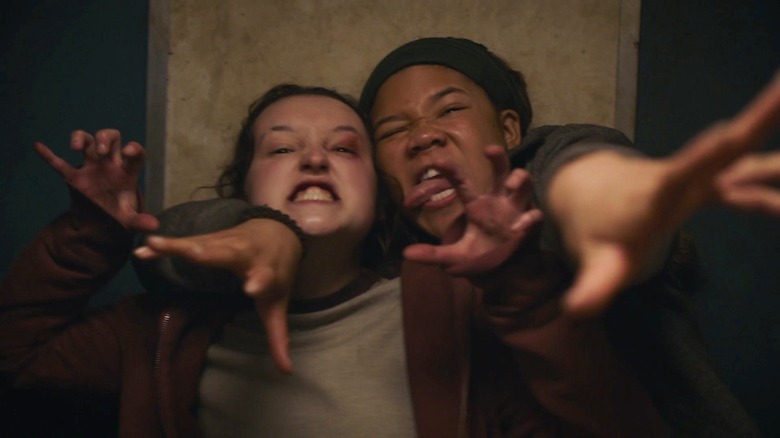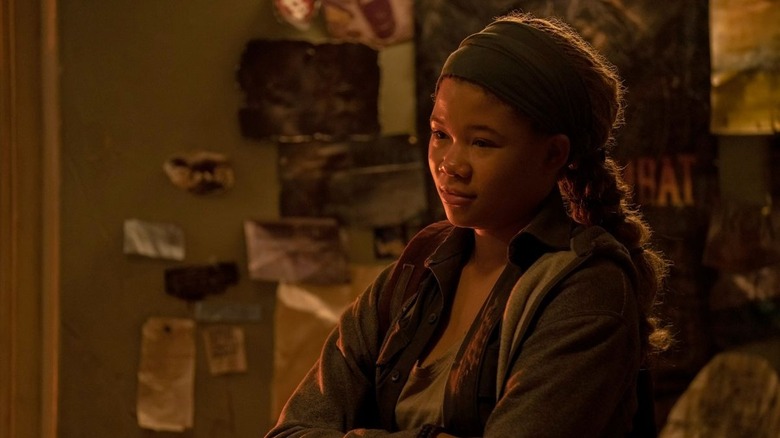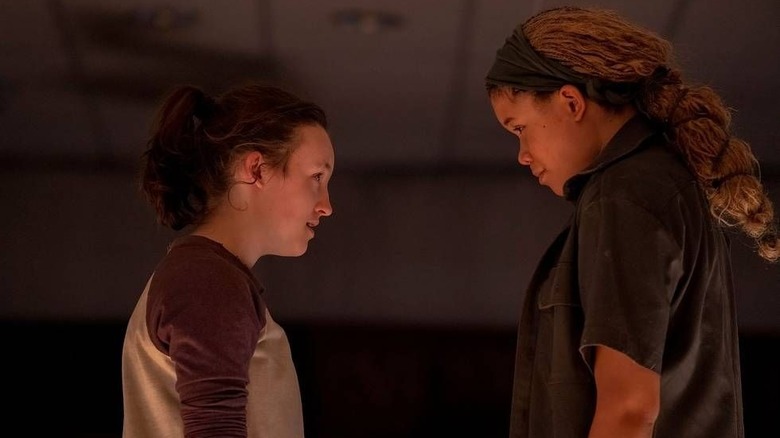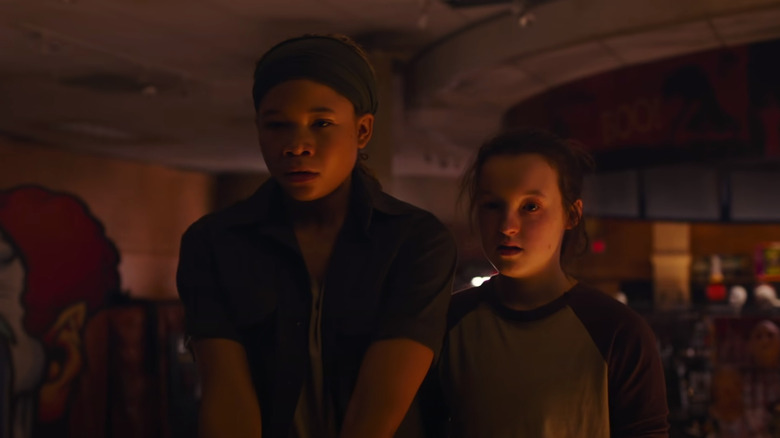The Last Of Us Episode 7 Nails What It's Like To Be A Teenager
One of the most striking artistic choices in the original "The Last of Us" game is the big perspective shift from our burly protagonist to our youthful companion character, Ellie (Bella Ramsey), right after Joel (Pedro Pascal) gets severely injured back in a scene that bookends the Fall chapter. There's a level of ambiguity over Joel's fate that lingers as we play as Ellie for the first time. In this week's episode of the HBO series, "Left Behind," based on the DLC chapter of the same name, we're immediately reassured that Joel is indeed still alive and kicking. While we've lost the jarring shift to the cruelty of the Winter section of the game, this episode still presents Ellie with a choice to make by the end of this episode: Will Ellie follow Joel's wishes to return to the Jackson commune without him?
Naturally, it's time for an interlude. Most of episode 7 flashes back to what is essentially Ellie's own origin story — we've gotten to know her as a foul-mouthed girl with a distrust of authority and an obsession with space, but this episode takes the time to show us how that stubborn and brash attitude was born from a special kind of adolescent vulnerability. When Ellie's best friend, Riley (Storm Reid) comes back into Ellie's life after running away for four weeks, she tells Ellie she's found a new purpose and sense of belonging with the rebel faction, the Fireflies.
There's evidently a lot of love between Ellie and Riley, but there's also a gap in maturity and experience that informs their own worldviews. In many ways, "Left Behind" perfectly captures the ignorance and the melodrama of being a teenager. Just when Ellie thinks she has the world figured out, Riley challenges her to look deeper.
Older and wiser, Riley has found her purpose
As two characters that were orphaned at young ages, both Ellie and Riley were indoctrinated into the FEDRA military boarding school in the Boston Quarantine Zone. The fascist pipeline of chewing up the youth and spitting out well-behaved soldiers is the only life they had ever known before the events that make up this episode. Both young girls have an incredibly tough, fighting spirit (Ellie gave her bully 15 stitches at the infirmary, and Riley admits to her own fair share of fights), but while Ellie is optimistically primed as a promising future officer, Riley has consistently been getting the short end of the stick.
At nearly 17 years old, Riley knows she's capable of more; she has a dream of changing the infrastructure of the QZ and liberating Boston from fascist control one day, but all hopes of shaping the system from the inside were wasted away as she was offered degrading duties below her abilities. Frustrated, Riley runs away, and unsure of when she'll return, she leaves Ellie behind without a word. It's here when she meets Marlene, begins her life as a Firefly, and finds purpose fighting for their cause. As she finds out she eventually needs to leave her station near the boarding school, she gives Ellie one special night at an abandoned mall as a way to say goodbye to her best friend.
Of course, through 14-year-old Ellie's eyes, it was never going to be that simple. As a girl that's only ever known life in the QZ, surely, FEDRA isn't that bad? At least, they do the same amount of damage as the Fireflies, who blow up FEDRA stations. Isn't it better to be an officer than a "terrorist?"
The philosophical rift between Ellie and Riley's ages
It's initially a shock to see Ellie parrot these centrist talking points to Riley, especially as a character who is known to have a distrust towards authority and clearly hates her life at the FEDRA boarding school — but when I look back on the kind of beliefs I had at 14, it all starts to click. It's already not a societal norm to teach our children to question the power structures around them, so one would imagine that is especially true for young Ellie. She has only ever known a world under FEDRA control and has seen very little alternative.
Though there are only 3 years between Ellie's 14 and Riley's 17, the difference in maturity and capacity for moral complexity feels decades apart. As an individual, Riley has just started to open her eyes to the nuances of justice and freedom fighting, which requires genuine hard work and sometimes, even justified violence. But Ellie, who has only previously understood the world in absolute black-and-white morality, cannot even begin to comprehend why Riley would want to put herself in danger and perform violence for what seems to be a lost cause.
A philosophical rift forms and continually grows between the girls as they enjoy their outing at the mall, and once this is combined with a realization that Riley, her best friend is leaving her for good, Ellie's entire life comes to a crash and burn in one night. It feels so authentically adolescent that even in the late apocalypse, the severity of breaking up with a loved one feels more like the proper end of the world.
Growing up too fast
Once the girls finally make their amends and Ellie begins to understand Riley's motivations in a heart-to-heart, they share their very first kiss. Foolish and in love, they decide on another fittingly teenage solution: running away together. Then, "Left Behind" reaches its logical endpoint. Like most things in "The Last of Us," all these moments of humane beauty are quickly tinged with tragedy. Ellie and Riley are bitten by an infected, and their time together is unfortunately cut short once again. Riley then tells Ellie that they should savor every last moment they have, "We can be all poetic and s*** and just lose our minds together."
Of course, we know that Ellie survives the bite, but we can only imagine what she had to do to Riley as she turned (luckily, that horror is left offscreen in both game and show). But, even though she's gone, Riley ultimately gave Ellie something that she will value for the rest of her life: perspective. Riley's final moments are juxtaposed with the present moment in the plot: Ellie finds medical supplies to help stitch up Joel's open wound. Will Ellie go back to Jackson in safety, or try to keep Joel alive at all costs?
She couldn't save Riley, but she learned some crucial life lessons from her best friend that night. Ellie knows now that the world is complicated and cruel, but she must fight not just for what she believes in, but for who she loves. Riley's words echo, "Whether it's three minutes, or three days — we don't give that up."
In honor of her best friend and first love, Ellie continues to nurture Joel — her protector won't be left behind.



